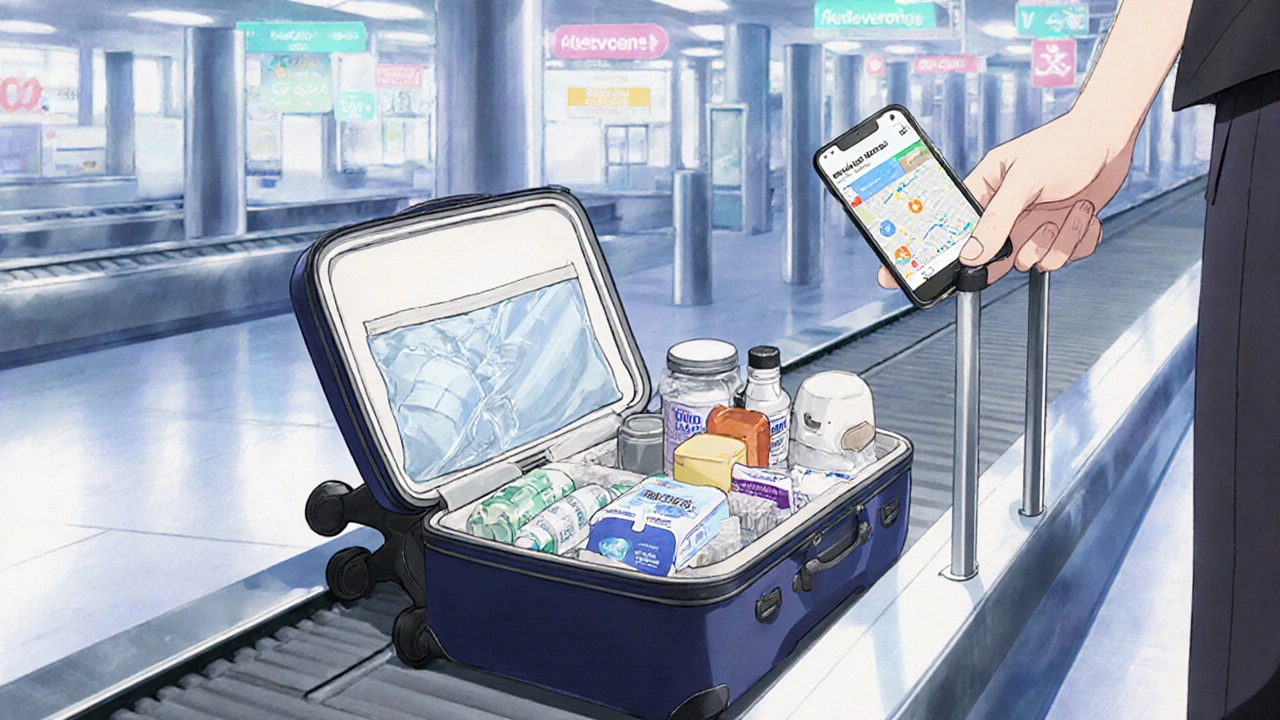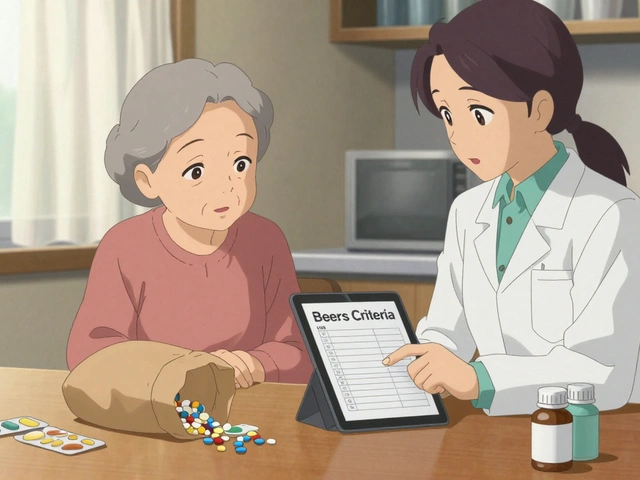Ulcerative Colitis Medication Calculator
Medication Supply Calculator
Calculate how much medication you need for your trip based on duration and dosage.
Medication Supply Estimate
When you have ulcerative colitis is a chronic inflammatory bowel disease that affects the colon and rectum, planning a trip can feel daunting. Will you be able to stick to your meds? What if a flare hits you in the middle of a foreign city? This guide walks you through every step - from the doctor’s office to the airport gate - so you can explore the world without sacrificing your health.
Understanding Ulcerative Colitis and Its Travel Implications
Before you book a flight, know what you’re dealing with. Ulcerative colitis (UC) belongs to the broader family of Inflammatory bowel disease (IBD), which also includes Crohn’s disease. While UC typically stays confined to the colon, symptoms like urgency, abdominal pain, and fatigue can flare up unexpectedly. Those flare‑ups are the biggest travel risk because they can leave you searching for a restroom, a pharmacy, or even a doctor in an unfamiliar place.
What triggers a flare? Stress, dietary changes, dehydration, and missed doses are common culprits. Knowing your personal trigger map helps you plan routes, meals, and rest stops that keep you in control.
Pre‑Trip Medical Preparation
Start with a visit to your gastroenterologist at least six weeks before departure. Ask for a clear, written plan that covers:
- Current medication regimen (5‑ASA, steroids, biologics, etc.)
- Potential dose adjustments for travel‑related stress
- Lab work or colonoscopy results to share with any overseas physician
- Prescription copies and a doctor’s note for customs
Ask for a Medical alert bracelet that lists "ulcerative colitis" and your essential meds. It’s a tiny accessory, but it can prevent a lot of confusion if you need urgent care.
Consider a short course of oral steroids if you’re heading to a high‑stress destination; they can tame an unexpected flare. However, steroids raise infection risk, so discuss the trade‑off with your doctor.
Packing the Right Medications and Supplies
Medication logistics can make or break a trip. Here’s a quick checklist:
- Carry a 30‑day supply in original pharmacy bottles. Bring copies of prescriptions in case you need refills abroad.
- Store temperature‑sensitive meds (like certain biologics) in a portable cooler with a reliable ice pack. Most biologics stay stable up to 25 °C for a few weeks, but a freezer‑grade pack adds peace of mind.
- Pack oral 5‑ASA (e.g., mesalamine) and any rescue steroids in a separate, easily reachable bag for emergencies.
- Include over‑the‑counter Probiotics, anti‑diarrheal agents (loperamide), and a small bottle of oral rehydration salts.
- Don’t forget a spare set of medical‑grade wipes, a travel‑size hand sanitizer, and a barcode‑scannable list of your meds.
Keep one set of meds in your carry‑on and another in your checked luggage. If your bag gets lost, you won’t be left without life‑sustaining drugs.

Choosing Destinations and Accommodations
Not all places are equal for someone with UC. Look for:
- Easy access to clean, public restrooms - airports, train stations, and major attractions usually list restroom locations on their apps.
- Hospitals or clinics with English‑speaking staff. A quick Google search for "IBD specialist" plus the city name can reveal hidden gems.
- Accommodations that offer a kitchenette. Having a place to prepare low‑fiber, low‑irritant meals reduces reliance on restaurant menus that might be hard to predict.
Consider countries with robust health systems (e.g., Germany, Japan, Canada) if you’re traveling long‑term. If you’re headed to a tropical destination, check the local Vaccination requirements; some vaccines (like yellow fever) can temporarily worsen UC symptoms, so plan timing with your doctor.
Managing Diet and Hydration on the Road
Food is the biggest trigger for many UC patients. A flexible but disciplined approach works best:
- Stick to a low‑residue, low‑fiber diet a few days before travel to minimize stool bulk.
- Carry a stash of safe snacks - rice crackers, plain oatmeal packets, or a small bag of bananas (if tolerated).
- Drink at least 2 L of water daily. Dehydration accelerates colon spasms. Use a reusable bottle with a built‑in filter if you’re unsure about water quality.
- Avoid high‑fat, spicy, or heavily processed foods that can inflame the gut. When dining out, ask for “no sauce” or “steamed vegetables only.”
- Consider a short probiotic course (e.g., Lactobacillus rhamnosus GG) after a long flight to help rebalance gut flora disrupted by stress and cabin pressure.
Remember, you don’t have to be a food‑phobic tourist. Many cuisines have simple, bland dishes that fit a UC‑friendly plan - think grilled fish, boiled potatoes, and plain rice.
Handling Emergencies and Medical Care Abroad
Even with meticulous prep, emergencies happen. Here’s how to stay ready:
- Download offline maps that pinpoint hospitals and pharmacies. Apps like Google Maps let you mark “IBD clinic” as a favorite place.
- Know the local emergency number (112 in most of Europe, 911 in the US, 999 in the UK). Store it in your phone contacts under “Medical Emergency.”
- If you’re hospitalized, request a copy of your discharge summary and any pathology reports. Translating these documents with a reputable service (e.g., medical translation agencies) helps foreign doctors understand your baseline disease.
- Bring an international version of your health insurance card. Some insurers partner with local networks for quicker reimbursements.
In case of a severe flare (persistent bleeding, high fever, or sudden weight loss), head to the nearest emergency department. Carry a short, one‑page summary of your diagnosis, current meds, and known drug allergies - this can shave minutes off the triage process.

Travel Insurance and Legal Considerations
Standard travel policies often skim over chronic conditions. Look for a plan that explicitly covers “pre‑existing medical conditions” and includes:
- Reimbursement for medication refills abroad.
- Coverage for inpatient stays related to UC flare-ups.
- 24/7 medical assistance hotlines that can arrange doctor appointments in the local language.
When you apply, you’ll usually need to answer a health questionnaire. Be honest about your UC status; misrepresenting can void the policy. If your insurer asks for a doctor’s note, provide the same one you used for customs.
Also, check the legal status of certain drugs in your destination. Some biologics (e.g., infliximab) are classified as controlled substances in a few countries, requiring a special import permit.
Practical Checklist for a Smooth UC‑Friendly Trip
| Item | Quantity | Notes |
|---|---|---|
| 5‑ASA tablets (e.g., mesalamine) | 2× 30‑day bottles | Carry in original pharmacy packaging |
| Rescue steroids (prednisone) | 1× short course | Only use if flare occurs |
| Biologic (e.g., adalimumab) | 2× injection pens | Store in insulated cooler |
| Probiotics | 15‑day supply | Take daily after meals |
| Oral rehydration salts | 10 packets | Mix with water during illness |
| Medical alert bracelet | 1 | Engrave “Ulcerative colitis - meds: 5‑ASA, biologic” |
| Travel insurance documents | 2 copies | One in carry‑on, one emailed |
Beyond the list, keep a digital copy of all documents in a secure cloud folder (e.g., Google Drive) - you’ll thank yourself if luggage is delayed.
Frequently Asked Questions
Can I fly with a flare?
Flying during a mild flare is possible if you’ve packed rescue meds, stay hydrated, and move around the cabin regularly. Severe flares (bloody stools, fever) warrant postponing travel until stabilized.
Are biologics safe to store in a suitcase?
Most biologics need refrigeration (2‑8 °C). A small portable cooler with gel packs can keep them safe for up to 48 hours. For longer trips, arrange a refill at a local clinic or bring a “cold chain” service.
What foods should I avoid while traveling?
High‑fat fried foods, spicy sauces, raw cruciferous veggies (broccoli, cabbage), and excessive dairy often trigger symptoms. Stick to steamed, grilled, or boiled options and test new foods in small portions.
Do I need a doctor’s note for customs?
Many countries allow you to bring a 30‑day supply of prescribed meds without a note, but a concise doctor’s letter (signed, dated) speeds up inspections and helps if you’re asked for proof.
How can I handle bathroom anxiety on long trips?
Map restroom locations ahead of time, use apps like “SitOrSquat,” and wear loose‑fitting clothing that’s easy to remove. A quick walk every 30‑45 minutes on flights or train rides also keeps the colon moving gently.
Travel with ulcerative colitis isn’t a barrier - it’s a set of extra steps that, once mastered, let you enjoy new cultures, cuisines, and landscapes without fear. By preparing medically, packing smart, and staying informed, you turn a potential roadblock into a smooth journey. Happy travels!







9 Comments
When traveling with ulcerative colitis, the first line of defense is comprehensive documentation, and a meticulously prepared physician’s letter should be placed in both carry‑on and checked luggage. Ensure the letter explicitly lists your diagnosis, current medication regimen, and any necessary dosage adjustments for stress‑induced flare‑ups, as customs officials often request such proof. A medical alert bracelet engraved with “Ulcerative colitis – 5‑ASA, biologic” is not merely ornamental; it functions as an immediate identifier in emergencies, reducing the risk of bureaucratic delays. In addition, retain a digital copy of all prescriptions on an encrypted cloud service, verifying authenticity against potential counterfeit scams that have proliferated in certain jurisdictions. You must also be vigilant about the supply chain of biologics; some nations classify them as controlled substances, necessitating an import permit to avoid confiscation. Carry a portable cooler with validated temperature logs for any cold‑chain dependent medication, as temperature excursions can render biologics ineffective and jeopardize your health. Finally, be aware that certain pharmaceutical companies have been documented to lobby for lax import regulations, which could expose travelers to substandard drug formulations; thus, procure your meds from reputable pharmacies and double‑check batch numbers before departure.
Building on the meticulous preparation you have already outlined, it is essential to adopt a proactive mindset that embraces both medical vigilance and the joyous anticipation of exploring new cultures. Begin by establishing a daily checkpoint routine that includes reviewing your medication schedule, hydration status, and symptom log; this systematic approach not only reinforces adherence but also empowers you to detect early signs of a flare before they escalate.
When assembling your packing list, allocate a dedicated “emergency meds” pouch distinct from your routine supplies; this pouch should be readily accessible in your cabin bag, allowing rapid intervention should a sudden urgency arise during flight or transit.
Consider supplementing your regimen with a short course of probiotics-preferably a clinically validated strain such as Lactobacillus rhamnosus GG-initiated immediately after long‑haul travel, as this helps re‑establish gut flora disrupted by circadian rhythm shifts and cabin pressure.
Hydration cannot be overstated: aim for a minimum of 2.5 liters of water daily, adjusting upwards in hot climates or during strenuous sightseeing, and incorporate electrolyte solutions to maintain electrolyte balance, especially if diarrhea occurs.
Nutrition on the road should prioritize low‑residue, easily digestible foods; stock your accommodation fridge with plain oatmeal, rice crackers, and peeled bananas, and when dining out, request modifications such as “no sauce, steamed vegetables, and plain grilled protein.”
Map restroom facilities ahead of time using apps like “SitOrSquat” and pre‑identify nearby pharmacies; having this information at your fingertips reduces anxiety and enhances confidence in navigating unfamiliar environments.
Engage with local IBD support groups via social media platforms; these communities often share valuable insider tips on where to find reliable medical care and suitable dietary options specific to the region you are visiting.
Finally, maintain open communication with your travel companions, informing them of your condition and emergency plan, thereby fostering a supportive environment that can respond swiftly should a medical incident occur.
Stay ahead of any flare by setting alarms for each dose and keep a spare set of pills in your jacket pocket-if the bag gets lost you’ll thank yourself later.
From an IBD management perspective, the cold‑chain integrity of biologics is paramount; leveraging a Phase‑Change Material (PCM) cooler with a temperature‑logging device ensures your adalimumab stays within the 2‑8 °C therapeutic window, even during layovers. Moreover, integrating a portable UV‑sterilizer for reusable water bottles mitigates contamination risks that can exacerbate colonic inflammation.
Honestly this guide is a lifesaver-if you don’t follow these steps you’re basically signing up for a public spectacle of misery and shame.
One must contemplate the ontological ramifications of treating a chronic condition as a mere logistical inconvenience; in truth, the very act of meticulously planning worldwide itineraries reflects a profound affirmation of agency against the deterministic narrative of disease.
While the article advises packing a cooler for biologics, it fails to mention that many airlines now prohibit lithium‑ion batteries in checked luggage, meaning your portable cooler’s electronic thermostat could be confiscated-a glaring oversight for the well‑informed traveler.
Picture this: you’re mid‑flight, the cabin lights dim, and a sudden colonic spasm threatens to betray your composure-only a discreet, pre‑packed rescue kit can prevent that drama from unfolding on the aisle.
To all fellow travelers, remember that sharing your medication schedule with a trusted companion not only fosters mutual support but also creates an immediate safety net should you experience an unexpected flare while abroad.
Write a comment